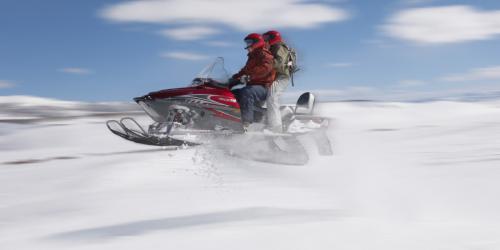Snowmobiling is a popular winter sport in Alberta. Anyone who is into the sport knows it is more of a culture. Many back country roads are only accessible by snowmobile during the winter months, and it is one form of transportation that makes travel in some of our smaller communities possible. Along with the fast speeds on unpredictable terrains come snowmobiling injuries. It’s likely that at least someone you know has suffered injury from a snowmobile accident. As experienced personal injury lawyers, we have talked to many snowmobile accident victims who want to know whether they can recover damages for their injuries.
The answer in many cases is “Yes,” a snowmobile accident victim will have a legal right to compensation. This may be the case where the accident victim was a passenger on the back of a snowmobile, and they suffered injuries as a result of the negligent operation of the machine by the driver. If the driver was operating the snowmobile while impaired, driving at excessive speeds or recklessly, or did not properly maintain the machine, he or she might well be found negligent.
Snowmobiling Accidents
A 2016 Maclean’s article illustrates just how dangerous snowmobiling can be. It indicates that 1200 or more Canadians are treated in hospitals with snowmobile-related injuries each year, and references, as recent events, five snowmobilers dying in an avalanche near McBride, British Columbia, two more snowmobilers perishing in Ontario, a third dying after falling through the ice and a fourth dying after striking a snow mound and vaulting into the trees. A father and his 14-year-old son collided head-on near their cabin in eastern Manitoba, and both died at the scene.
Such accidents can create devastating and tragic outcomes including death. Given that a passenger or driver of a snowmobile is hurtling through the air and snow, usually at high speeds, frequently over unknown terrain containing hidden obstacles, and with little protection, severe injuries can result, including traumatic brain injuries, spinal cord injuries, severe fractures, and chronic pain.
Snowmobiling and the Law in Alberta
Alberta has enacted legislation and regulations which establish some basic requirements for snowmobile operators, (subject to exceptions, in some cases, for the ranching and farming communities, and the indigenous community). A snowmobile must be registered and insured, and helmets must be worn by the driver and passenger at all times. Alberta law prohibits a teenager under 14 from driving a snowmobile unless supervised by an adult of at least 18 years of age. Alberta law also prohibits the registration of a snowmobile to anyone under the age of 18 unless their parent or guardian consents. Careless driving of a snowmobile is also a specific offence.
What Canadian Cases say About Damages for Snowmobiling Injuries
As mentioned, a passenger on a snowmobile may have a claim for damages against the driver and the owner of the snowmobile if the machine is negligently operated. This was the case in this 1999 Ontario decision where the passenger riding behind the snowmobile driver was suddenly knocked off when her body struck the post of a mailbox located near the shoulder of a rural road. The snowmobile then collided with a car parked on the roadside. The court found the snowmobile driver negligent because he did not have proper care and control of his snowmobile and collided with the parked car. He was also held negligent for driving too close to the mailbox when he knew or should have known that it was located near the roadway, as this was a rural area.
In this 2002 British Columbia case, the passenger had not ridden on a snowmobile before. She told the driver, her boyfriend at the time, that this was her first time on a snowmobile and asked him to drive slowly. He did so at first but then started to drive faster. When she complained about his speed, he called her a “wuss.” She was thrown from the snowmobile while they were cornering on a trail and was run over by the machine, fracturing her left ankle. The driver of the snowmobile was found liable for her injuries as he had failed to heed her requests to drive slowly and did not maintain sufficient control of the snowmobile to avoid ejecting his inexperienced passenger and running over her.
In this 2004 Alberta case, two friends decided to go pick up another snowmobile at a neighbour’s property just before they watched the Grey Cup football game. The driver drove too quickly over the fields, which were not deeply covered with snow, and ran into a ditch. The plaintiff was ejected from the snowmobile, his foot caught, and he was dragged behind. The passenger suffered significant back injuries. The defendant driver argued at trial that he should not be liable for the damages of the passenger as the passenger had voluntarily accepted the risk inherent in snowmobiling. He referred to a 1971 Ontario case which stated that: ” … it is common knowledge, people frequently fall off snowmobiles. It is part of the very nature of the sport. The very hazard of falling off into the snow and the sensation of risk is part of the thrills that add to the attractiveness and popularity of the sport…” This argument was not accepted, and the defendant driver was held liable as he had been traveling too fast to allow him to react responsibly to the hazard of the ditch.
This 2013 New Brunswick case is an example of an injured driver of a snowmobile successfully claiming damages against a property owner who had created a hazard on the snowmobile trail that crossed its lands. The defendant company owned a business where they operated heavy equipment such as a payloader, which frequently crossed the snowmobile trail that went through the property. The employees of the company were cautioned to take care not to create hazards on the snowmobile trail, but a deep ditch was in fact dug out by a payloader shortly after the snowmobile trail had been groomed. The plaintiff snowmobile driver was ejected from his machine when he ran into the ditch, injuring him and causing damage to his snowmobile. He successfully sued for damages.
These examples show that there are situations in which a passenger on a snowmobile or, sometimes, the driver of the snowmobile, can successfully sue for damages. If either you or a loved one has been the victim of a snowmobile accident, please CONTACT the friendly, helpful and knowledgeable lawyers at CAM LLP for a free consultation, and we can help you assess the situation.

